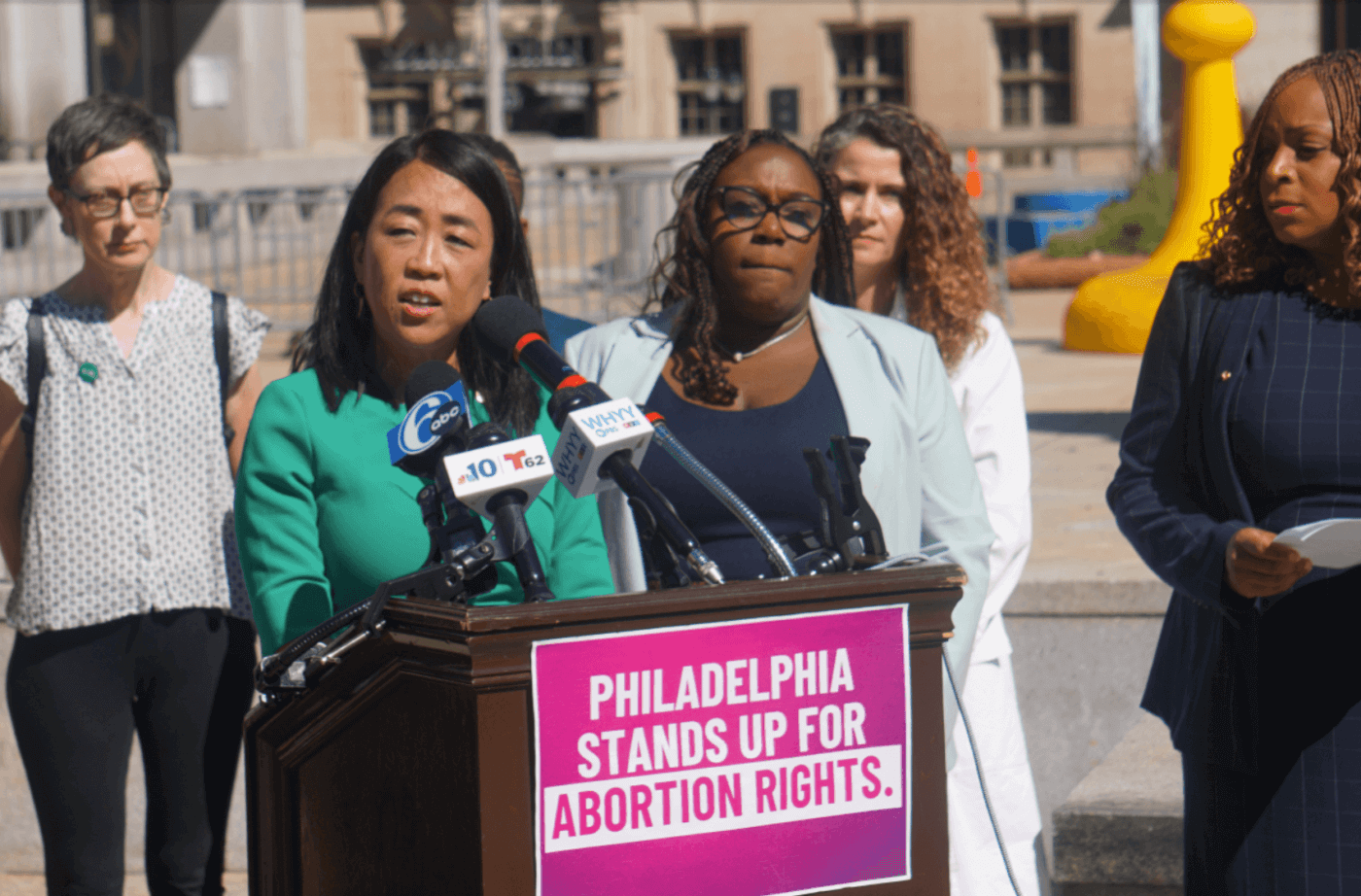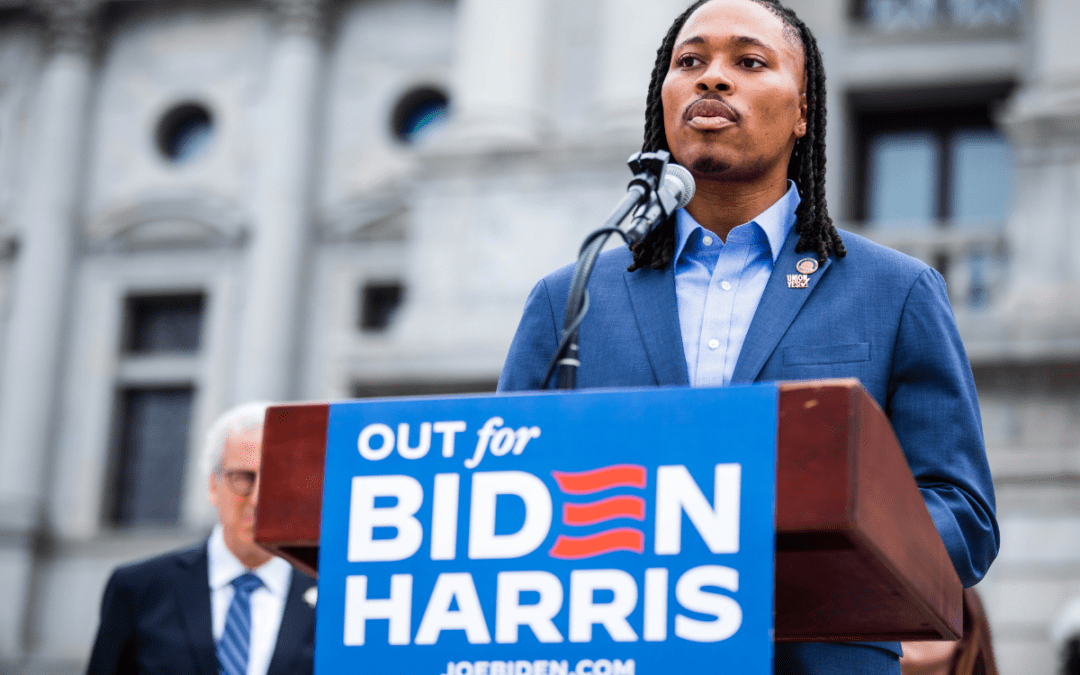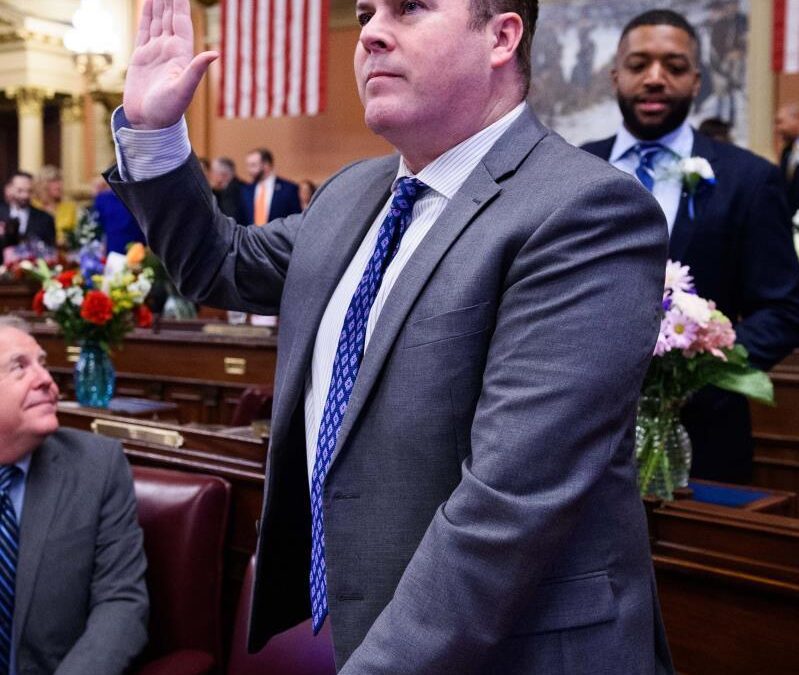
Philadelphia city councilmembers Helen Gym (At-Large), Kendra Brooks (At-Large), and Jamie Gauthier (3rd District) at a press conference to announce legislation protecting abortion access in the city, Sept. 14, 2022.
The measures would protect abortion access within Philadelphia, update the city’s anti-discrimination law to protect reproductive health decisions, and bar city resources from being used to cooperate with out-of-state investigations.
Three Philadelphia City Council members have introduced legislation aimed at protecting abortion access within city limits and establishing privacy protection laws for those seeking or providing reproductive health care in the city.
The joint legislation was introduced by councilmembers Helen Gym (At-Large), Kendra Brooks (At-Large), and Jamie Gauthier (3rd District).
The measures would:
● Limit the sharing of information on reproductive healthcare decisions for the purposes of prosecution or civil suits.
● Protect patients and providers from “vigilante” lawsuits related to reproductive healthcare decisions by enacting a right to counter-sue.
● Update Philadelphia’s anti-discrimination laws to protect reproductive health decisions from workplace discrimination and retaliation.
The legislative package also aims to work with providers to increase safety at clinics, and to create an abortion access task force and to support allocating additional city funds to help offset the costs of abortions and reproductive care among other requests.
“We want to affirm our municipal rights at this time to be able to establish new protections for individuals, for people here in this city and to be able to send that message broadly across the state and across the country,” Gym said during a press conference Wednesday to announce the legislation.
While Philadelphia City Council members who support the measure expect pushback, Gym said she hoped the bills would set some legal precedent and “advance new territory” in protecting reproductive health decisions.
Philadelphia isn’t the first municipality in the commonwealth to consider local regulations around abortion access.
Pittsburgh City Council passed three bills in July aimed at protecting access to abortion locally. Those measures included a law that protects abortion providers from out-of-state investigations — known as a shield law and legislation that requires local law enforcement agencies to deprioritize the enforcement of any criminal ban on abortion enacted at the state level.
The third Pittsburgh bill increased scrutiny on practices at pregnancy crisis centers, which often work to dissuade pregnant women from seeking abortions. It creates a complaint process for what the council said were deceptive practice and a way to refer those complaints for possible criminal investigation.
Pennsylvania’s Democratic Gov. Tom Wolf signed an executive order in July protecting out-of-state individuals seeking abortion services in the commonwealth, as well as for the medical professionals who provide the services.
These efforts to protect abortion access in Pensylvania follow the US Supreme Court’s June decision overturning Roe v. Wade, a ruling that pushed regulating abortions to states. The proposed Philadelphia legislation comes less than two months before midterm elections that will likely decide the future of abortion access in Pennsylvania moving forward.
On Tuesday, Republican US Sen. Lindsey Graham introduced a bill to ban abortions nationwide after 15 weeks. The bill won’t be considered before November since Democrats currently control the Senate.
Since the fall of Roe v. Wade at the end of June, sudden abortion bans and restrictions in neighboring states have made it necessary for more people to travel to Pennsylvania for abortion services.
In 2020, there were 32,123 abortions performed in Pennsylvania, according to a report from the state Department of Health, with out-of-state patients accounting for 2,144 of those abortions.
Planned Parenthood Keystone estimates that 8,500 out-of-state patients could flock to Pennsylvania to seek abortion care this year. In particular, Planned Parenthood expects many of them will arive from neighboring states like Ohio, which passed a ban on abortions after 6 weeks in 2019, and West Virginia, where the state legislature just passed a ban on nearly all abortions, with narrow exceptions to save the pregnant person’s life or in cases of rape or incest, so long as the victim reports the crime. Abortion had been legal up to 20 weeks since July, when a state judge blocked a pre-Roe ban that dated back to the 19th century.
Since the end of June, staff at the Allegheny Reproductive Health Center in Pittsburgh have been answering 10x more phone calls and are helping 3x the number of patients, Dr. Sheila Ramgopal, OBGYN and CEO of the center, said. About 60% to 70% of current patients are from out of state, up from the center’s typical 30% rate.
Information from the Associated Press was used in this story.
Politics

Malcolm Kenyatta makes history after winning primary for Pa. Auditor General
State Rep. Malcolm Kenyatta, who was first elected to the state House in 2018, won the Democratic nomination for Pa. Auditor General and will...

Biden administration bans noncompete clauses for workers
The Federal Trade Commission (FTC) voted on Tuesday to ban noncompete agreements—those pesky clauses that employers often force their workers to...

Philadelphia DA cancels arrest warrant for state Rep. Kevin Boyle on eve of Pa. primary
Philadelphia District Attorney Larry Krasner said a detective had sought the warrant against Boyle, a Democrat whose district includes a section of...
Local News

Conjoined twins from Berks County die at age 62
Conjoined twins Lori and George Schappell, who pursued separate careers, interests and relationships during lives that defied medical expectations,...

Railroad agrees to $600 million settlement for fiery Ohio derailment, residents fear it’s not enough
Norfolk Southern has agreed to pay $600 million in a class-action lawsuit settlement for a fiery train derailment in February 2023 in eastern Ohio,...






